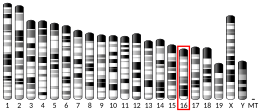From Wikipedia, the free encyclopedia
Protein-coding gene in the species Homo sapiens
Mucin-20 is a protein that in humans is encoded by the MUC20 gene .[ 5] [ 6]
^ a b c ENSG00000281630, ENSG00000277753, ENSG00000275501, ENSG00000275430, ENSG00000276583, ENSG00000278114, ENSG00000176945 GRCh38: Ensembl release 89: ENSG00000274843, ENSG00000281630, ENSG00000277753, ENSG00000275501, ENSG00000275430, ENSG00000276583, ENSG00000278114, ENSG00000176945 – Ensembl , May 2017^ a b c GRCm38: Ensembl release 89: ENSMUSG00000035638 – Ensembl , May 2017^ "Human PubMed Reference:" . National Center for Biotechnology Information, U.S. National Library of Medicine .^ "Mouse PubMed Reference:" . National Center for Biotechnology Information, U.S. National Library of Medicine .^ Higuchi T, Orita T, Nakanishi S, Katsuya K, Watanabe H, Yamasaki Y, Waga I, Nanayama T, Yamamoto Y, Munger W, Sun HW, Falk RJ, Jennette JC, Alcorta DA, Li H, Yamamoto T, Saito Y, Nakamura M (Jan 2004). "Molecular cloning, genomic structure, and expression analysis of MUC20, a novel mucin protein, up-regulated in injured kidney" . J Biol Chem . 279 (3): 1968– 79. doi :10.1074/jbc.M304558200 PMID 14565953 . ^ "Entrez Gene: MUC20 mucin 20, cell surface associated" .
Bonaldo MF, Lennon G, Soares MB (1997). "Normalization and subtraction: two approaches to facilitate gene discovery" . Genome Res . 6 (9): 791– 806. doi :10.1101/gr.6.9.791 PMID 8889548 . Nagase T, Kikuno R, Ishikawa KI, et al. (2000). "Prediction of the coding sequences of unidentified human genes. XVI. The complete sequences of 150 new cDNA clones from brain which code for large proteins in vitro" . DNA Res . 7 (1): 65– 73. doi :10.1093/dnares/7.1.65 PMID 10718198 . Dias Neto E, Correa RG, Verjovski-Almeida S, et al. (2000). "Shotgun sequencing of the human transcriptome with ORF expressed sequence tags" . Proc. Natl. Acad. Sci. U.S.A . 97 (7): 3491– 6. Bibcode :2000PNAS...97.3491D . doi :10.1073/pnas.97.7.3491 PMC 16267 PMID 10737800 . Strausberg RL, Feingold EA, Grouse LH, et al. (2003). "Generation and initial analysis of more than 15,000 full-length human and mouse cDNA sequences" . Proc. Natl. Acad. Sci. U.S.A . 99 (26): 16899– 903. Bibcode :2002PNAS...9916899M . doi :10.1073/pnas.242603899 PMC 139241 PMID 12477932 . Clark HF, Gurney AL, Abaya E, et al. (2003). "The secreted protein discovery initiative (SPDI), a large-scale effort to identify novel human secreted and transmembrane proteins: a bioinformatics assessment" . Genome Res . 13 (10): 2265– 70. doi :10.1101/gr.1293003 . PMC 403697 PMID 12975309 . Ota T, Suzuki Y, Nishikawa T, et al. (2004). "Complete sequencing and characterization of 21,243 full-length human cDNAs" . Nat. Genet . 36 (1): 40– 5. doi :10.1038/ng1285 PMID 14702039 . Higuchi T, Orita T, Katsuya K, et al. (2004). "MUC20 suppresses the hepatocyte growth factor-induced Grb2-Ras pathway by binding to a multifunctional docking site of met" . Mol. Cell. Biol . 24 (17): 7456– 68. doi :10.1128/MCB.24.17.7456-7468.2004 . PMC 506992 PMID 15314156 . Suzuki Y, Yamashita R, Shirota M, et al. (2004). "Sequence comparison of human and mouse genes reveals a homologous block structure in the promoter regions" . Genome Res . 14 (9): 1711– 8. doi :10.1101/gr.2435604 . PMC 515316 PMID 15342556 . Li G, Zhang H, Lv J, et al. (2006). "Tandem repeats polymorphism of MUC20 is an independent factor for the progression of immunoglobulin A nephropathy". Am. J. Nephrol . 26 (1): 43– 9. doi :10.1159/000091785 . PMID 16508246 . S2CID 38456730 .




